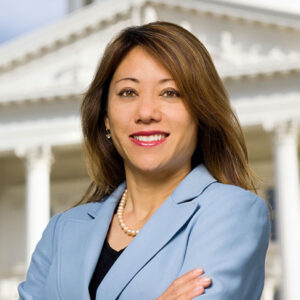Steal these speechwriting techniques from Niecy Nash-Betts’ powerful Emmy speech
How she had the audience in the palm of her hand.

“And you know who I want to thank? I want to thank me — for believing in me and doing what they said I could not do,” actress Niecy Nash-Betts proudly said as she accepted her win for Outstanding Supporting Actress in a Limited or Anthology Series or Movie at the 75th Emmy Awards. “And I want to say to myself in front of all you beautiful people, ‘Go on girl with your bad self. You did that.'”
Nash-Betts most certainly did that. She won the award for playing Glenda Cleveland in Netflix’s “Dahmer – Monster: The Jeffrey Dahmer Story” series.
She showed up larger-than-life in her stirring speech – and imparted several speechwriting lessons you can use.
Thank others first
Nash-Betts’ speech gained social media traction for how she thanked herself – but that only worked because she first thanked others.
Nash-Betts thanked God, professional colleagues, Emmy voters and her “better half.” She gave honor where it was due first. Her speech would have been too boastful if she had just thanked herself. The actress instead came across as both humble and confident.
Be bold
Nash-Betts’ self-affirming words made an impact because women often don’t take credit for their own wins.
According to the Division of Continuing Education at Harvard University, women don’t promote themselves at work as much as men.
A TikTok user posted: “She thanked herself and many people are too scared to do that! Amazing ❤️.”
“If you don’t self-promote, your contributions will probably not be visible nor recognized, which will limit your ability to get a promotion, a raise, or important projects that will help you advance in your career,” Harvard Extension School Business Strategy Instructor Areen Shahbari said in a Harvard blog.
If it doesn’t come naturally for your speaker to talk about their achievements, give them a couple of good, yet simple examples for them to talk about. Have them practice those aloud by themselves or in front of you until they feel comfortable. On the day of their speech, they’ll be ready to share their wins and a job well done confidently.
But everyone already knew Nash-Betts had done a good job – she had an Emmy in her hand, after all. So instead, she stuck to the qualities that had gotten her onto that stage with that statuette.
Social media was abuzz with countless commenters who posted about Nash-Betts’ speech being speech goals.
Fans like this X commenter adored Nash-Betts’ speech: “Niecy Nash giving a masterclass on how to make the most out of an #Emmys acceptance speech,” the commenter said.
Another X commenter posted that Nash-Betts’ speech was empowering because she “said what needed to be said.”
Nash-Betts also brought passion and humor to her speech. Help your speaker do the same by encouraging them to show emotion during a speech to bring life to their topic. When happy, Nash-Betts let tears of joy fall and the audience cherished those emotional moments with her.
Granted, she’s an actress, which means she’s had years to perfect her expressions. But as a speechwriter, you can still help your speaker learn how to bring big emotion to their speech.
Help them to get out of their comfort zone and lean into their emotional side authentically during a speech.
If there’s an emotional moment, build in pauses where they can take a moment to slow down. And if there’s a part where it’s time to emphasize something, coach them to bring high energy to that moment and not shy away from it.
Audiences pick up on authenticity as one TikTok commenter noted: “You can tell she being herself even in her roles. Look how she gave her speech. Wonderful actress ❤️”
Make audience connections
Playing Glenda Cleveland was personal for Nash-Betts.
Cleveland lived in an apartment around where serial killer Jeffrey Dahmer lived. Cleveland contacted police multiple times about Dahmer, but they took no action, according to USA Today. In one incident in 1991, Cleveland saw one of Dahmer’s victims, a 14-year-old boy, in an alley “dazed and naked” running away from Dahmer. She told police and they brushed her off – a repeated pattern.
“The fact that Dahmer was white and Cleveland was Black was not lost on outraged African Americans (in Milwaukee),” USA Today said.
Nor was it lost on Nash-Betts.
“Finally, I accept this award on behalf of every Black and brown woman who has gone unheard, yet overpoliced. Like Glenda Cleveland. Like Sandra Bland. Like Breonna Taylor. As an artist, my job is to speak truth to power, and baby, I’ma do it till the day I die.”
Taylor’s mom called the speech “amazing” because she acknowledged “women, including my daughter, who have tragically fallen victim to police brutality,” TMZ reported.
Nash-Betts touchingly shared the purpose behind her work, and it resonated.
Nash-Betts cannot heal these issues, but as a Black woman herself, she helped give life and representation to these hard topics with her words. She reminded the crowd what her job is all about. Nash-Betts had a unique platform to give voice to the voiceless. She made them a touching part of her victory that we all can celebrate alongside her.
Nash-Betts’ dedication to her award made the end of her speech all the more poignant.
Audiences want to feel seen, valued and understood and see your speaker’s humanity reflected in their words and actions. Help them get their every step of the way with what you write.
Learn more speechwriting tips at Ragan’s Public Affairs & Speechwriting Virtual Conference on Feb. 21.
Sherri Kolade is a writer and conference producer at Ragan Communications. She enjoys watching old films, reading and building an authentically curated life. Follow her on LinkedIn. Have a great PR/comms speaker in mind for one of Ragan’s events? Email her at sherrik@ragan.com.







